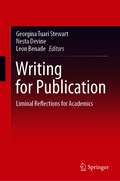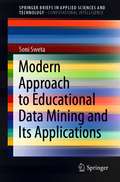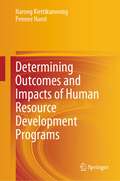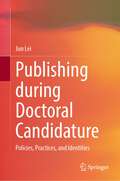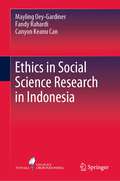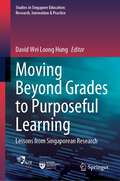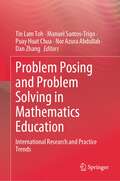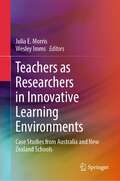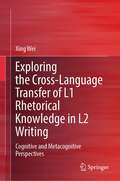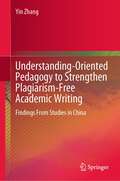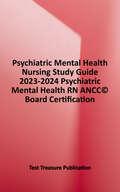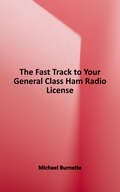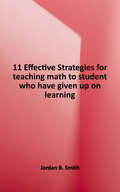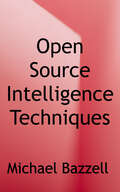- Table View
- List View
Writing for Publication: Liminal Reflections for Academics
by Leon Benade Georgina Tuari Stewart Nesta DevineThis book focuses on academic writing and how academics who are experts in their fields can translate their expertise into publishable form. The magnitude and speed of the changes that are transforming the global academic landscape produce an ongoing need for literature that interprets the nature of academic work. This book arises from the background discipline of Education, which is a relatively new university subject that draws on the entire knowledge spectrum from the fine arts to the natural sciences. Each chapter addresses an aspect of the conditions of written academic labour in an age of digital publishing: its nature, how it works, and guidance for successful navigation. This book will provide helpful guidance to graduate students, researchers and teachers in universities and higher education, who are united by the challenges of this new world of academic publishing.
Modern Approach to Educational Data Mining and Its Applications (SpringerBriefs in Applied Sciences and Technology)
by Soni SwetaThis book emphasizes that learning efficiency of the learners can be increased by providing personalized course materials and guiding them to attune with suitable learning paths based on their characteristics such as learning style, knowledge level, emotion, motivation, self-efficacy and many more learning ability factors in e-learning system. Learning is a continuous process since human evolution. In fact, it is related to life and innovations. The basic objective of learning to grow, aspire and develop ease of life remains the same despite changes in the learning methodologies. Introduction of computers empowered us to attain new zenith in knowledge domain, developed pragmatic approach to solve life’s problem and helped us to decipher different hidden patterns of data to get new ideas. Of late, computers are predominantly used in education. Its process has been changed from offline to online in view of enhancing the ease of learning. With the advent of information technology, e-learning has taken centre stage in educational domain. In e-learning context, developing adaptive e-learning system is buzzword among contemporary research scholars in the area of Educational Data Mining (EDM). Enabling personalized systems is meant for improvement in learning experience for learners as per their choices made or auto-detected needs. It helps in enhancing their performance in terms of knowledge, skills, aptitudes and preferences. It also enables speeding up the learning process qualitatively and quantitatively. These objectives are met only by the Personalized Adaptive E-learning Systems in this regard. Many noble frameworks were conceptualized, designed and developed to infer learning style preferences, and accordingly, learning materials were delivered adaptively to the learners. Designing frameworks help to measure learners’ preferences minutely and provide adaptive learning materials to them in a way most appropriately.
Determining Outcomes and Impacts of Human Resource Development Programs
by Narong Kiettikunwong Pennee NarotThis book takes readers on a comprehensive journey through ten chapters, seamlessly blending insights from the introductory chapter emphasizing the importance of human resource research with subsequent chapters delving into the complexities of evaluation, program conceptualization, and the integration of Theory of Change and Logic Model. The critical examination of prominent evaluation models, exploration of Participatory Evaluation's role, and the need for an integrated evaluation model are highlighted. The narrative culminates in a practical illustration of the integrated model, emphasizing its effectiveness, insights gained, and contributions to the field, while acknowledging limitations and offering recommendations for improvement. The book serves as a valuable resource for HR practitioners, evaluators, and organizational leaders, providing practical guidance and contributing substantively to the improvement of HR practices and organizational performance.
Publishing during Doctoral Candidature: Policies, Practices, and Identities
by Jun LeiThis book brings together policies, practices, and identities pertaining to doctoral publication through an in-depth longitudinal multiple-case study of doctoral students’ scholarly publishing endeavors. Informed by the theoretical frameworks of neoliberalism and activity theory, it examines doctoral students’ scholarly publishing activities within the context of their doctoral studies. It demonstrates how policies, practices, and identities intersect with each other and reveals how policies may shape doctoral students’ publishing practices and evolving identities. Postgraduates, researchers, and practitioners in the fields of applied linguistics and doctoral education will find it of particular interest. It is also a valuable guide for doctoral students seeking to have their work published and supervisors looking to support their doctoral students’ publishing efforts.
Ethics in Social Science Research in Indonesia
by Mayling Oey-Gardiner Fandy Rahardi Canyon Keanu CanThis textbook presents ethical guidelines for conducting research in the social sciences, focused on Indonesia. As a country with a fast-growing research environment, the real-life cases of ethical issues that arise in Indonesia can teach both aspiring and established researchers how to approach the complexity of research ethics and dilemmas. With technological advancement affecting how research is conducted, the necessary ethical guidelines for research are also evolving. The instantaneous nature of information movement has made confidentiality in research data more critical than before, and any negligence in protecting research participants has an unprecedented scope of damage. The methods book synthesises hundreds of worldwide ethical guidelines and past issues that social science researchers will find highly relevant. Arranged chronologically to represent each research stage—from research preparation to post-research—the book prepares researchers to mitigate ethical crises. Relevant to all social scientists, both emerging and established, conducting research in Indonesia, this co-published textbook between Springer and OBOR is also relevant to researchers beyond the archipelago. It is also an indispensable teaching resource for lecturers in research methods and ethics across social science disciplines.
Moving Beyond Grades to Purposeful Learning: Lessons from Singaporean Research (Studies in Singapore Education: Research, Innovation & Practice #5)
by David Wei Loong HungThis book explores future directions in Singaporean education as it moves beyond its historically formative goals of survival, efficiency and performance, and its emphasis on grades and formal credentialing. It examines the future of education via the 4Life framework, a four-form model for purposeful learning centered around social-emotional regulation and the well-being of the individual learner: Life-long learning, the learning that occurs over a learner's lifespan; Life-deep learning, a deep understanding of learned content and adaptive expertise; Life-wide learning, learning in multiple contexts besides the school environment; and Life-wise learning, learning which focuses on the learner's values, morals, character and historical empathy. This book also illustrates how purposeful learning serves to equip learners with the knowledge, skills, dispositions and competencies they need to thrive as adaptive workers in the economy of the future.
Problem Posing and Problem Solving in Mathematics Education: International Research and Practice Trends
by Tin Lam Toh Manuel Santos-Trigo Puay Huat Chua Nor Azura Abdullah Dan ZhangThis book presents both theoretical and empirical contributions from a global perspective on problem solving and posing (PS/PP) and their application, in relation to the teaching and learning of mathematics in schools. The chapters are derived from selected presentations in the PS/PP Topical Study Group in ICME14. Although mathematical problem posing is a much younger field of inquiry in mathematics education, this topic has grown rapidly. The mathematics curriculum frameworks in many parts of the world have incorporated problem posing as an instructional focus, building on problem solving as its foundation. The juxtaposition of problem solving and problem posing in mathematics presented in this book addresses the needs of the mathematics education research and practice communities at the present day. In particular, this book aims to address the three key points: to present an overview of research and development regarding students’ mathematical problem solving and posing; to discuss new trends and developments in research and practice on these topics; and to provide insight into the future trends of mathematical problem solving and posing.
Teachers as Researchers in Innovative Learning Environments: Case Studies from Australia and New Zealand Schools
by Julia E. Morris Wesley ImmsThis book presents and discusses the results of the ‘Plans to Pedagogy’ (P2P) project that was implemented across 13 diverse Australian and New Zealand schools, each with a unique school context and specific learning environment issue. The project employed a participatory approach, where academic researchers partnered with school leaders and staff in each school to co-design, implement, and evaluate research targeting the school’s chosen issue. It explores and analyses the case studies from the project and discusses a range of topics, including how space can be used as a pedagogic tool, determining the affordances of learning environments to engage students, how teacher collaboration can be enhanced in flexible spaces, and how furniture influences student engagement and teacher pedagogies. It also provides school leaders with authentic examples of how research can be utilised to drive evidence-based discussions about teacher practices and student learning. Finally, it also illustrates how teachers can design and implement powerful studies that underpin better pedagogies in their schools.
Exploring the Cross-Language Transfer of L1 Rhetorical Knowledge in L2 Writing: Cognitive and Metacognitive Perspectives
by Xing WeiThis book addresses the transfer of rhetorical knowledge from a first language (L1) to a second language (L1-to-L2 rhetorical transfer), a common cognitive phenomenon in the L2 writing of students in foreign language learning environments. It investigates L1-to-L2 rhetorical transfer from a cognitive perspective and examines a specific component of L2 writers’ agency in this transfer, namely metacognition. The book’s ultimate goal is to enhance our understanding of the cognitive mechanism of rhetorical transfer across languages. This goal is in turn connected to the need to determine how L1 rhetorical knowledge can be steered and oriented toward successful L2 writing.To this end, this book proposes a theoretical framework for transfer studies, encompassing the dimensions of text, transfer agency, and L2 essay raters. It facilitates an in-depth exploration of the intricacies involved in L1-to-L2 rhetorical transfer. It then presents empirical studies on this transfer. Embracing a dynamic perspective, this book furthers our understanding of interlingual rhetorical transfer as a conscious or intuitive process for making meaning, one that can be monitored and steered. Moreover, it discusses the pedagogical implications for L2 writing instruction that guides students to use metacognition to transfer L1 rhetorical knowledge during L2 writing.
Understanding-Oriented Pedagogy to Strengthen Plagiarism-Free Academic Writing: Findings From Studies in China
by Yin ZhangThis book discusses the plagiarism-free academic writing in higher education. It demonstrates how to orchestrate an understanding-oriented pedagogy (including the teaching of plagiarism and source use) in order to facilitate plagiarism-free academic writing among undergraduates by revealing studies in China. This book emphasizes that plagiarism is a mere symptom of educational problems and plagiarism urgently needs education-based solutions instead of punish solutions. It highlights that students' meaningful understandings of plagiarism and source use should be identified as the main learning objectives of plagiarism instruction, as well as features the adoption of plagiarism instruction in academic writing practices in subject courses. It also focuses on the potentials of Information and Communication Technology (ICT) in scaffolding learning and teaching under plagiarism pedagogy beyond merely detecting plagiarism. This book also contributes to the discussion about the validity of current plagiarism assessment scales by providing evidences to challenge them and proposing a new one. This book is of great benefits for readers to increase knowledge and promote positive attitudes toward plagiarism and plagiarism instruction. It adds to our knowledge of how plagiarism in higher education can be effectively prevented by adopting an understanding-oriented pedagogy. It also adds to our knowledge of how Chinese undergraduates and their instructors view plagiarism and cope with plagiarism in discipline-based courses, which provides robust evidence for the academic debate about whether culture has effects on students’ plagiarism in academic writing. Finally, it provides insights about the relationship among plagiarism, pedagogy, and technology.
Psychiatric Mental Health Nursing Study Guide 2023-2024 Psychiatric Mental Health RN ANCC© Board Certification
by Test Treasure PublicationUnlock Your Potential and Conquer the Psychiatric Mental Health Nursing Exam with the Ultimate Study Guide! Are you an aspiring psychiatric-mental health nurse determined to ace the ANCC-PMHN Exam? Looking for an all-inclusive study guide that offers more than just textbook information? Your search ends here! Introducing the "Psychiatric-Mental Health Nursing Study Guide 2023-2024", brought to you by Test Treasure Publication—the gold standard in exam preparation resources. Why Choose This Guide? We understand that preparing for the ANCC-PMHN Exam can be overwhelming, which is why we’ve crafted a comprehensive guide that not only covers the essential information but also provides practical tools for effective learning. <p><p>Inside This Guide, You'll Find: <p><p>1. Brief Overview of the Exam and Its Importance: Understand the exam pattern, administered by the American Nurses Credentialing Center, including the number of questions, scoring methodology, and its significance in the nursing profession. <p><p>2. Detailed Content Review: Dive deep into four core study sections—Assessment and Diagnosis, Planning, Implementation, and Evaluation—each replete with individual chapters that break down complex topics into digestible bites. - Assessment and Diagnosis: Developmental Stages, Psychiatric Disorders, and more. - Planning: Cultural Competence, Treatment Planning, and more. - Implementation: Theoretical Frameworks, Medication Management, and more. - Evaluation: Legal and Ethical Considerations, Evidence-Based Practice, and more. <p><p>3. Study Schedules and Planning Advice: Tailored study plans to suit your learning style and schedule. <p><p>4. Frequently Asked Questions: Clear answers to common queries and misconceptions about the exam. <p><p>5. Test-Taking Strategies & Overcoming Test Anxiety: Effective techniques for smart exam-taking and managing stress. <p><p>6. Additional Resources: A curated list of online platforms and academic materials to supplement your study plan. <p><p>7. Final Words with Motivation: Words of encouragement and inspiration as you gear up for the big day. <p><p>8. Two Full-Length Practice Tests: Each with 100 questions and detailed answer explanations, to gauge your preparedness and sharpen your test-taking skills.
The Fast Track to Your General Class Ham Radio License: Comprehensive Preparation for all FCC General Class Exam Questions July 1, 2023 through June 30, 2027
by Michael BurnetteEverything you need to prepare for your General Class ham license. Covers every question on the General exam. Memorizing 400+ random answers is hard -- and boring. Learning is easy! <p><p>If you've made the decision to open up your ham radio world by going for the General Class License, great! General is certainly more challenging than Technician, but The Fast Track to Your General Class Ham Radio License explains the reasoning and technology behind each correct answer on the General Class exam so you'll understand and remember the subject matter. <p><p>Created by an experienced ham and adult educator, it's like having your own, patient, experienced, good-humored mentor for the exam. <p><p>To get your General Class license you must pass a multiple-choice test. The General license test consists of 35 questions drawn from a pool of about 400. Memorizing the answers to 400+ disconnected questions is difficult, but The Fast Track makes getting your upgrade easier by explaining the logic behind each correct answer. It's simple: When you understand the material, and you have a context for the material, you remember the answers and pass the test. <p><p>Best of all, once you've passed your exam you'll have a solid grounding in ham radio basics. <p>• Includes every possible question and every answer <p>• Correct answers clearly marked in bold <p>• Precise instructions for how to locate a testing session, how to prepare, and even what to bring -- and what not to bring -- to the test. <p>• All technical topics are explained in clear, plain language, often with illustrations (over 200 of them!) <p>• Step-by-step instructions to solve all the math problems <p>• Test-taking strategies <p>• Hints to easily solve many questions and avoid the traps in the test <p>• Written in "learning order", not just the (confusing) order of the official question bank. <p>• Covers questions that will be used through June 30, 2027. - Over 300 pages packed with information
11 Effective Strategies for Teaching Math to Students Who Have Given Up on Learning
by Jordan B. SmithAs a special needs teacher, your time is already limited. From meetings to paperwork, there is little time left for actual teaching. Do you really have time to do more? These 11 strategies aren’t about doing more. It’s about getting the most out of your students most effectively and practically. They will enable students to develop a deep love of math and skills they can take with them for other subjects and into adulthood. No matter the level of despondency among your students, "11 Effective Strategies for Teaching Math to Students Who Have Given Up on Learning" equips you with the tools to revitalize your passion for math. Turn your classroom into a dynamic hub of exploration and discovery, and witness the joy of learning rekindled among your students. If you're ready to transform your math teaching journey and empower every student to succeed, this book adds to your collection of math teaching books.
Open Source Intelligence Techniques: Resources for Searching and Analyzing Online Information
by Michael BazzellNew (2022) 9th Edition contains many updated techniques, scripts, and tools! It is time to look at OSINT in a different way. For many years, and within previous editions of this book, we have relied on external resources to supply our search tools, virtual environments, and investigation techniques. We have seen this protocol fail us when services shut down, websites disappear, and custom resources are dismantled due to outside pressures. <p><p>This book aims to correct our dilemma. We will take control of our investigative resources and become self-reliant. There will be no more need for online search tools; we will make and host our own locally. We will no longer seek pre-built virtual machines; we will create and configure our own. This book puts the power back in your hands. <p><p>The new OSINT professional must be self-sustaining and possess their own tools and resources. You will become a more proficient subject matter expert who will be armed with the knowledge and readiness to articulate the sources of your findings. <p><p>This new ninth edition contains hundreds of pages which have been updated to keep your OSINT investigative methods fresh. It includes new online and offline search tools; a new Linux OSINT virtual machine with pre-built scripts; and tutorials to replicate all Linux OSINT tools within Mac and Windows operating systems. Brand-new search methods for Facebook, Instagram, LinkedIn, YouTube, and others ensure you have the latest techniques within your online investigation arsenal. An entire section is devoted to Methodology, Workflow, Documentation, and Ethics which provides a clear game plan for your next active investigation.
